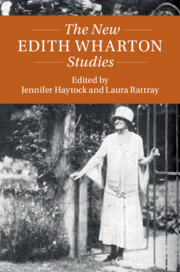Book contents
- The New Edith Wharton Studies
- Twenty-First-Century Critical Revisions
- The New Edith Wharton Studies
- Copyright page
- Contents
- Notes on Contributors
- Acknowledgments
- Editions and Abbreviations
- Introduction
- Part I Self and Composition
- Part II International Wharton
- Chapter 4 Edith Wharton’s Odyssey
- Chapter 5 Edith Wharton’s French Engagement
- Chapter 6 Edith Wharton and Transnationalism
- Part III Wharton on the Margins
- Part IV Sex and Gender Revisited
- Bibliography
- Index
Chapter 6 - Edith Wharton and Transnationalism
from Part II - International Wharton
Published online by Cambridge University Press: 28 November 2019
- The New Edith Wharton Studies
- Twenty-First-Century Critical Revisions
- The New Edith Wharton Studies
- Copyright page
- Contents
- Notes on Contributors
- Acknowledgments
- Editions and Abbreviations
- Introduction
- Part I Self and Composition
- Part II International Wharton
- Chapter 4 Edith Wharton’s Odyssey
- Chapter 5 Edith Wharton’s French Engagement
- Chapter 6 Edith Wharton and Transnationalism
- Part III Wharton on the Margins
- Part IV Sex and Gender Revisited
- Bibliography
- Index
Summary
“Edith Wharton and Transnationalism” traces the intersecting themes of gender, exile, cosmopolitanism, and transnationalism in Wharton’s postwar novels. The essay proposes that distinctions between cosmopolitanism (characterized by wealth, voluntary mobility across national boundaries, and personal autonomy) and transnationalism (characterized by economic precarity, involuntary mobility, and alienated workers) break along gender lines. In the postwar novels, vulnerable agents, typically young women, try to establish a secure base for themselves despite lacking either economic capital (in The Reef and Glimpses of the Moon) or a social cachet lost through their actions (The Mother’s Recompense, Hudson River Bracketed, The Gods Arrive), in both cases experiencing a rootless existence at odds with the travel among countries and cultures in which their male counterparts engage. Wharton’s signposts of transnationalism, among them a focus on transportation and movement, mechanically mediated communications, economic exchanges for social benefits, and adoptive motherhood figure within these novels as a means of illustrating not so much the value of rootedness as the effects of modernity in erasing it as a possibility for transnational women.
Keywords
- Type
- Chapter
- Information
- The New Edith Wharton Studies , pp. 96 - 110Publisher: Cambridge University PressPrint publication year: 2019

